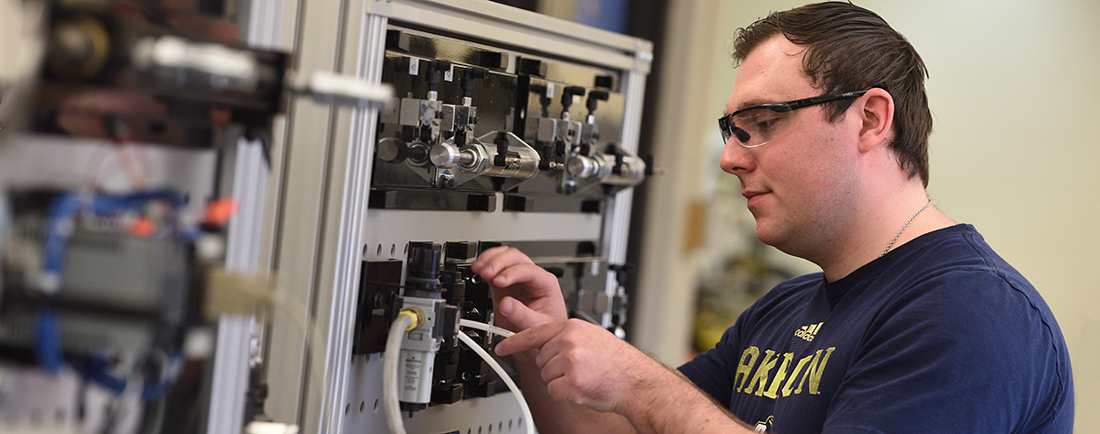
Ph.D. in Engineering
Become an expert in your field with a Ph.D. in Engineering
Develop an expert-level understanding of your engineering discipline with the interdisciplinary Ph.D. in Engineering at The University of Akron. Our program offers advanced study and research emphasizing qualitative research methods and specialized courses designed to equip students with advanced scientific research skills. Students conduct original research alongside faculty and fellow graduate students.
Who? |
Anyone who wants to reach the highest academic achievement in engineering and has a love of research. |
|---|---|
What? |
The program consists of coursework and independent research, then concludes with a dissertation and oral defense. |
Why? |
A doctoral degree allows you to become an expert researcher in your field. Common career paths include: academic positions, R&D in engineering, consulting firms, government agencies and more. |
Student spotlight


“Choosing The University of Akron for my Ph.D. means stepping into a community where innovation meets opportunity. With a strong foundation in rigorous academics, personalized mentorship and a collaborative spirit, UA empowers scholars like me to not only advance knowledge but also shape the future of our fields.”
Asmita Shinde
Ph.D. student in Mechanical Engineering
Hometown: Kolhapur, India
Alumni spotlight


“The University of Akron provided access to state-of-the-art resources, including advanced analytical equipment and a fully equipped machine shop. Working alongside graduate students from various engineering disciplines and experienced faculty, I experienced an incredible sense of community in the labs.”
Dr. Andrew Ditto
B.S. in Biomedical Engineering, '04
Ph.D. in Biomedical Engineering, '10
Director of R&D and Chief Scientist, Gebauer Company
ADMISSIONS REQUIREMENTS
Applicants to the program must meet the general admission requirements of The University of Akron Graduate School along with the following additional program-specific requirements:
-
Applicants must hold a bachelor’s degree from a program that is accredited by the Engineering Accreditation Commission of ABET at the time of graduation or provide satisfactory evidence of an equivalent academic background to The University of Akron.
-
Applicants with a Master of Science degree must provide satisfactory evidence of an equivalent engineering baccalaureate background.
-
Applicants must submit three letters of recommendation, a statement of purpose, and a resume.
-
While we typically expect incoming students to have a minimum 3.0 GPA, we take a holistic approach to reviewing applications. We consider a variety of factors beyond just GPA to determine whether an applicant is a good fit for our program. Every applicant who meets the Graduate School’s minimum 2.5 GPA requirement will be carefully evaluated for admission based on all the materials they provide.
-
Applicants with a bachelor’s degree in a discipline other than engineering shall have completed undergraduate coursework in calculus, differential equations, and have one year of classical physics at a minimum. A student’s chosen home department sets additional course requirements as shown below. Students may need to take undergraduate and / or graduate bridge-up courses depending on their background; if they need significant bridge-up coursework they will start at UA as undergraduate guest students. An applicant’s bridge-up coursework is determined by the home department’s graduate admissions committee.
Doctoral students are expected to have engineering undergraduate coursework as follows: one year of chemistry; engineering statics; thermodynamics; and at least four of the following five topics: materials science, transport phenomena, electrical circuits, solid mechanics, measurement and analysis of signals. Students typically bridge from undergraduate programs in biology, chemistry, chemical engineering, materials science, physics, and medicine.
Doctoral students are expected to have undergraduate coursework in material and energy balances or equivalent, and at least one of the following courses: equilibrium thermodynamics, transport phenomena, chemical reaction engineering, mass transfer operations, or fluids & thermal operations. Students can bridge from undergraduate programs in chemistry, math, statistics, physics, or related STEM fields.
Doctoral students are expected to have engineering undergraduate coursework in engineering statics, dynamics, solid mechanics, and fluid mechanics; and advanced engineering coursework in at least one of the following areas: theory and design of structures, hydraulics and soil mechanics, steel and reinforced concrete design, transportation engineering, water supply and environmental engineering. Students typically bridge from undergraduate programs in construction and other areas of engineering.
Doctoral students are expected to have engineering undergraduate coursework in circuits and electronics including engineering analysis and design of electronics, active circuits and/or power electronics; systems analysis and design based on differential equations and linear system theory for communications and/or digital controls; and advanced engineering coursework in at least two of the following areas: energy conversion, electromagnetics, embedded systems, digital hardware, control systems, electric motor drives, integrated circuit design. Students typically bridge from undergraduate programs in physics, mathematics, computer science, and other areas of engineering.
Doctoral students are expected to have engineering undergraduate coursework in statics, dynamics, solid mechanics, fluid mechanics and thermodynamics; and advanced engineering coursework in at least one of the following areas: thermodynamics and heat transfer; analysis and design of mechanical components; systems dynamics and control system design; materials science and engineering. Students typically bridge from undergraduate programs in physics, mathematics, and other areas of engineering.
ADMISSIONS PROCESS
After submitting your application, please use the checklist in the student portal as a guide. If you would like to check your application status or make corrections, contact the Office of Admissions at admissions@uakron.edu.
For more information
Direct questions to:
Esther Wain-Weiss
Director, Graduate Programs and Administration
330-972-5690
erw3@uakron.edu
